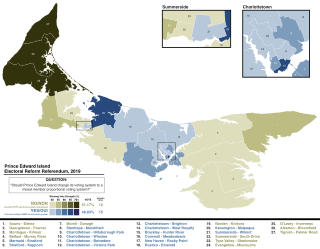
A referendum is a direct vote by the electorate on a proposal, law, or political issue. This is in contrast to an issue being voted on by a representative. This may result in the adoption of a new policy or specific law, or the referendum may be only advisory. In some countries, it is synonymous with or commonly known by other names including plebiscite, votation,popular consultation, ballot question, ballot measure, or proposition.

In political science, an initiative is a means by which a petition signed by a certain number of registered voters can force a government to choose either to enact a law or hold a public vote in the legislature in what is called indirect initiative, or under direct initiative, where the proposition is put to a plebiscite or referendum, in what is called a Popular initiated Referendum or citizen-initiated referendum.

The North East England devolution referendum was an all postal ballot referendum that took place on 4 November 2004 throughout North East England on whether or not to establish an elected assembly for the region. Devolution referendums in the regions of Northern England were initially proposed under provisions of the Regional Assemblies (Preparations) Act 2003. Initially, three referendums were planned, but only one took place. The votes concerned the question of devolving limited political powers from the UK Parliament to elected regional assemblies in North East England, North West England and Yorkshire and the Humber respectively. Each were initially planned to be held on 4 November 2004, but on 22 July 2004 the planned referendums in North West England and in Yorkshire and the Humber were postponed, due to concerns raised about the use of postal ballots, but the referendum in North East England was allowed to continue, particularly as it was assumed that the region held the most support for the proposed devolution.

In California, a ballot proposition is a referendum or an initiative measure that is submitted to the electorate for a direct decision or direct vote. If passed, it can alter one or more of the articles of the Constitution of California, one or more of the 29 California Codes, or another law in the California Statutes by clarifying current or adding statute(s) or removing current statute(s).
In the politics of the United States, the process of initiatives and referendums allow citizens of many U.S. states to place new legislation, or to place legislation that has recently been passed by a legislature on a ballot for a popular vote. Initiatives and referendums, along with recall elections and popular primary elections, are signature reforms of the Progressive Era; they are written into several state constitutions, particularly in the West. It is a form of direct democracy.

A referendum was held in the Canadian province of British Columbia on May 17, 2005, to determine whether or not to adopt the recommendation of the Citizens' Assembly on Electoral Reform to replace the existing first-past-the-post electoral system (FPTP) with a single transferable vote system (BC-STV). It was held in conjunction with the BC Legislative Assembly election of 2005. Voters were given two ballots at that time: a ballot to vote for a Member of the Legislative Assembly of British Columbia (MLA) in their constituency and a referendum ballot. The referendum received considerable support from the electorate but failed in meeting the 60-percent threshold that had been set. A second referendum was held in 2009.

Malta elects on a national level 6 MEPs representing Malta in the European Parliament, on a district level the legislature, On a local level the Local Councils and on a community level the Administrative Committees.

An Ontario electoral reform referendum was held on October 10, 2007, on the question of whether to establish a mixed member proportional representation (MMP) system for elections to the Legislative Assembly of Ontario. The vote was strongly in favour of the existing plurality voting or first-past-the-post (FPTP) system.
Voting in Switzerland is the process by which Swiss citizens make decisions about governance and elect officials. The history of voting rights in Switzerland mirrors the complexity of the nation itself. The polling stations are opened on Saturdays and Sunday mornings but most people vote by post in advance. At noon on Sunday, voting ends and the results are usually known during the afternoon.

Referendums are held only occasionally by the Government of New Zealand. Referendums may be government-initiated or held in accordance with the Electoral Act 1993 or the Citizens Initiated Referenda Act 1993. Nineteen referendums have been held so far. Fourteen were government-led, and five were indicative citizen initiatives.
Electoral reform in Virginia refers to efforts to change the electoral system in the Commonwealth of Virginia. Virginia has undergone much electoral change since its settling in 1607, many of which were required by federal legislation. However, it remains a relatively conservative state in this respect compared to California and others which have experimented with various alternative systems.

Elections in Oregon are all held using a Vote by Mail (VBM) system. This means that all registered voters receive their ballots via postal delivery and can vote from their homes. A state Voters’ Pamphlet is mailed to every household in Oregon about three weeks before each statewide election. It includes information about each measure and candidate in the upcoming election.
Electoral reform is a change in electoral systems which improves or worsens how public desires are expressed in election results. That can include reforms of:
Direct democracy refers to decision making by vote at public meetings, such as is found in many New England towns in the form of open town meetings, that date back to colonial times. It may also refer to state and local referendums, where a proposal, law, or political issue is put to a direct vote by the electorate, rather than being voted on by representatives in a state or local legislature or council.
A referendum is a direct vote in which an entire electorate is asked to either accept or reject a particular proposal. This article summarises referendum laws and practice in various countries.

A referendum on electoral reform was held on April 23, 2019, in the Canadian province of Prince Edward Island – simultaneously with the 2019 provincial election – to determine if the province should adopt a mixed-member proportional representation voting system (MMP). A narrow majority voted to keep the existing first-past-the-post system. However, the referendum was not binding, as neither the yes or no side received majority support in 60% or more of the province's 27 electoral districts.
A referendum on electoral reform was held on 10 October 2018 in Guernsey to determine an electoral system for elections to the States of Guernsey. Voters were asked to rank five different proposed electoral systems, with a run-off system used to determine the winning proposal. Option A, a 38-member constituency covering the whole island, won the vote. As a result of voter turnout (45%) being above the 40% vote threshold, the referendum was binding.

A three-part referendum was held in Liechtenstein on 30 August 2020. Voters were asked whether they approve of an initiative proposing changes to the constitution to promote the equal representation of women in political bodies, a parliament law allowing dual citizenship for naturalised citizens, and a decision by the government to fund a railway line expansion. All three proposals were rejected.

A referendum on holding a constitutional convention was held in the US Virgin Islands on 3 November 2020 alongside general elections. 72% of voters responding to the referendum question voted in favour and turnout was above the threshold required.

A two-part consultative referendum on changing the system of governance was held in Saint Helena on 17 March 2021. In the first question, voters were asked whether there should be a change. In the second, they were asked for their preference on the form of governance, choosing between a committee system and a ministerial system.













